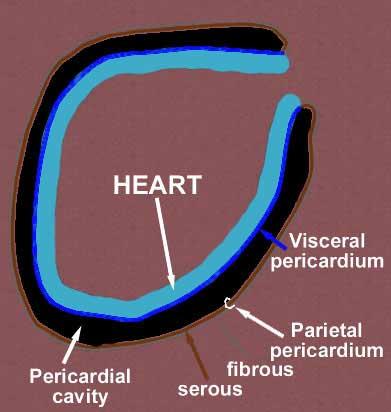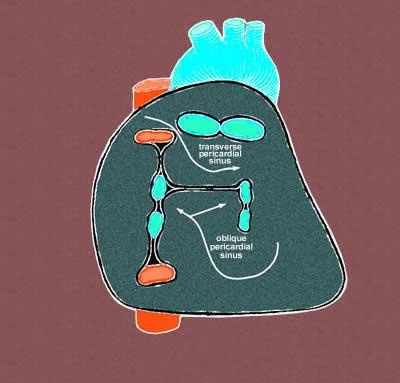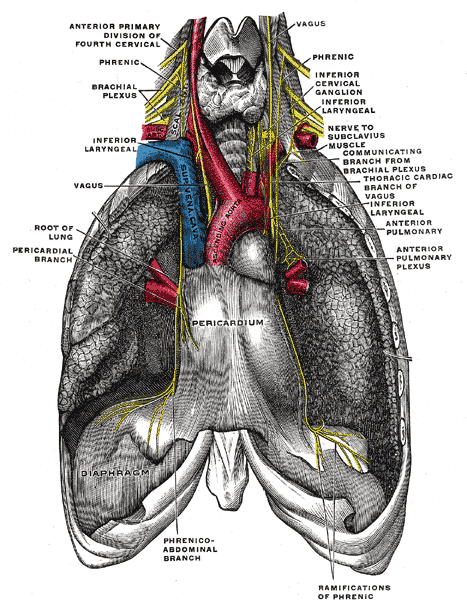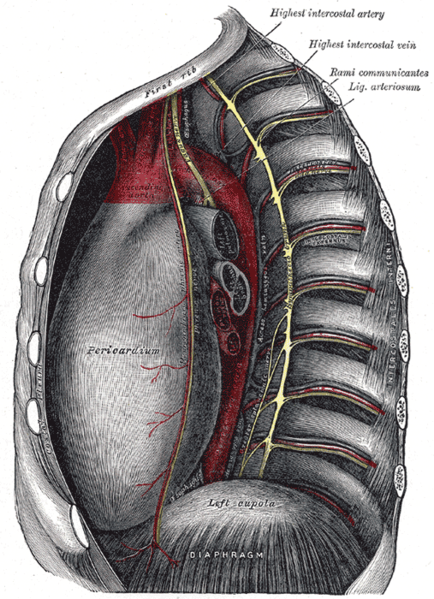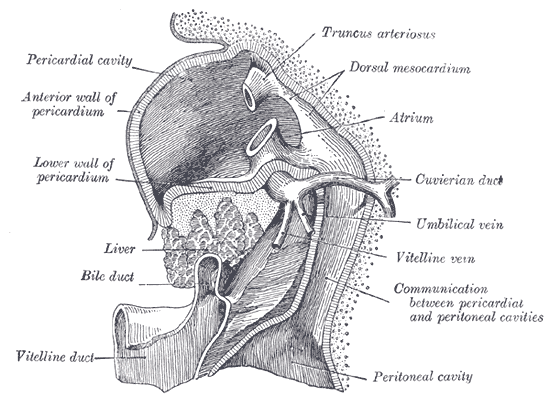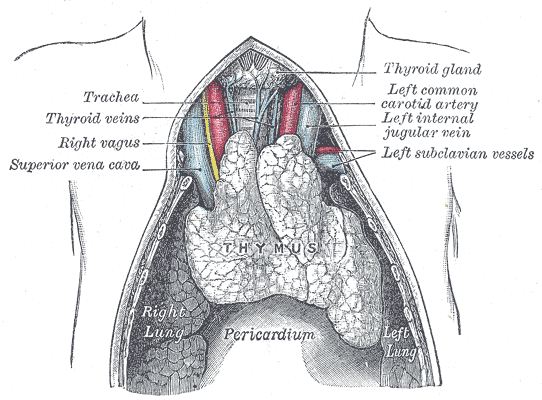Pericardium: Difference between revisions
(→Layers) |
No edit summary |
||
| (4 intermediate revisions by the same user not shown) | |||
| Line 18: | Line 18: | ||
==Layers== | ==Layers== | ||
*The [[pericardium]] is made up of two layers: | *The [[pericardium]] is made up of two layers: | ||
**Fibrous | **Fibrous pericardium | ||
***Hard protective external layer | ***Hard protective external layer | ||
***Attached to [[sternum]] anteriorly by sterno-pericardial ligaments and fused with the central tendon of the [[diaphragm]] and great vessels to allow mobility of the pericardial sac against sudden cardiac overfilling | ***Attached to [[sternum]] anteriorly by sterno-pericardial ligaments and fused with the central tendon of the [[diaphragm]] and great vessels to allow mobility of the pericardial sac against sudden cardiac overfilling | ||
**Serous | **Serous pericardium | ||
***Smooth internal layer made up of 2 components: | ***Smooth internal layer made up of 2 components: | ||
****Parietal: reflects onto fibrous pericardium | ****Parietal: reflects onto fibrous pericardium | ||
| Line 30: | Line 30: | ||
*There are two small chambers or sinuses located where the visceral and parietal pericardia are continuous with one another within the pericardial cavity. | *There are two small chambers or sinuses located where the visceral and parietal pericardia are continuous with one another within the pericardial cavity. | ||
*Transverse sinus: | *Transverse sinus: | ||
**Located posterior to the [[pulmonary trunk]] and [[ascending aorta]] at the level between the [[superior vena cava]] and [[aortic arch]] | **Located posterior to the [[pulmonary trunk]] and [[ascending aorta]] at the level between the [[superior vena cava]] and [[aortic arch]] | ||
**Formed after dorsal mesocardium rupture embryonically | **Formed after dorsal mesocardium rupture embryonically | ||
**Functional role is to allow the unhindered expansion of great arteries posteriorly during cardiac [[systole]] | **Functional role is to allow the unhindered expansion of great arteries posteriorly during cardiac [[systole]] | ||
**Utilized surgically to pass surgical clamps or place ligatures around great arteries. | **Utilized surgically to pass surgical clamps or place ligatures around great arteries. | ||
*Oblique sinus: | *Oblique sinus: | ||
**A blind recess (cul-de-sac) posterior to the [[left atrium]] between [[superior vena cava]], right and left [[pulmonary vein]]s inferior to the transverse sinus | **A blind recess (cul-de-sac) posterior to the [[left atrium]] between [[superior vena cava]], right and left [[pulmonary vein]]s inferior to the transverse sinus | ||
**Formed embryonically by the incorporation of the [[pulmonary vein]] tributaries into the [[left atrium]] | **Formed embryonically by the incorporation of the [[pulmonary vein]] tributaries into the [[left atrium]] | ||
**Functional role believed to be the expansion of the left atrium upon normal collapse of the thorax | **Functional role believed to be the expansion of the left atrium upon normal collapse of the thorax<ref = “Kishore”>Kishore, K. (2003). The Heart of Structural Development: The Functional Basis of the Location and Morphology of the Human Vascular Pump. J Postgrad Med, 49:282-4.</ref><ref = "Moore">Moore, K. L., Agur, A. M., & Dalley, A. F. (2011). Essential Clinical Anatomy - Fourth Edition. Lippincott Williams & Wilkins.</ref><ref = "Tank">Tank, P. W. (2009). Grant's Dissector - Fourteenth Edition. Lippincott Williams & Wilkins.</ref> | ||
<div align="center"> | <div align="center"> | ||
| Line 49: | Line 49: | ||
* [[Pericarditis]] is an inflammatory condition of the pericardium. | * [[Pericarditis]] is an inflammatory condition of the pericardium. | ||
* [[Pericardial effusion]] is fluid accumulation in the pericardial sac. | * [[Pericardial effusion]] is fluid accumulation in the pericardial sac. | ||
* [[Constrictive pericarditis]] occurs when there is a scar encasing the heart that chronically constricts the filling of the heart. | * [[Constrictive pericarditis]] occurs when there is a scar encasing, the heart that chronically constricts the filling of the heart. | ||
* [[Cardiac tamponade]] is a medical emergency in which fluid in the pericardial sac acutely restricts the filling of the heart. This requires surgical drainage or [[pericardiocentesis]]. | * [[Cardiac tamponade]] is a medical emergency in which fluid in the pericardial sac acutely restricts the filling of the heart. This requires surgical drainage or [[pericardiocentesis]]. | ||
| Line 63: | Line 63: | ||
==References== | ==References== | ||
{{Reflist|2}} | {{Reflist|2}} | ||
[[Category:Best pages]] | |||
[[Category:Cardiac anatomy]] | [[Category:Cardiac anatomy]] | ||
[[Category:Cardiology]] | [[Category:Cardiology]] | ||
Latest revision as of 21:13, 17 January 2013
|
Pericarditis Microchapters |
|
Diagnosis |
|---|
|
Treatment |
|
Surgery |
|
Case Studies |
|
Pericardium On the Web |
|
American Roentgen Ray Society Images of Pericardium |
Editor-In-Chief: C. Michael Gibson, M.S., M.D. [1]; Assistant Editor(s)-in-Chief: Rim Halaby
Overview
The pericardium is a double-walled sac that contains the heart and the roots of the great vessels. Morphologically, it is a conical-shaped, double-walled fibro-serous membrane. It rests posteriorly to the sternum at the level of second to sixth costal cartilages and T5-T8 vertebrae.
Layers
- The pericardium is made up of two layers:
- Fibrous pericardium
- Serous pericardium
- Smooth internal layer made up of 2 components:
- Parietal: reflects onto fibrous pericardium
- Visceral: reflects onto heart and great vessels and forms the epicardium, the external layer of the heart wall
- Smooth internal layer made up of 2 components:
- Pericardial cavity: Potential space between parietal and visceral layers. It contains a serous fluid film that occupies the cavity and functions as lubricant against friction by all chest movements.[1][2][3]
Pericardial Sinuses
- There are two small chambers or sinuses located where the visceral and parietal pericardia are continuous with one another within the pericardial cavity.
- Transverse sinus:
- Located posterior to the pulmonary trunk and ascending aorta at the level between the superior vena cava and aortic arch
- Formed after dorsal mesocardium rupture embryonically
- Functional role is to allow the unhindered expansion of great arteries posteriorly during cardiac systole
- Utilized surgically to pass surgical clamps or place ligatures around great arteries.
- Oblique sinus:
- A blind recess (cul-de-sac) posterior to the left atrium between superior vena cava, right and left pulmonary veins inferior to the transverse sinus
- Formed embryonically by the incorporation of the pulmonary vein tributaries into the left atrium
- Functional role believed to be the expansion of the left atrium upon normal collapse of the thorax[4][5][6]
Diseases of the Pericardium
- Pericarditis is an inflammatory condition of the pericardium.
- Pericardial effusion is fluid accumulation in the pericardial sac.
- Constrictive pericarditis occurs when there is a scar encasing, the heart that chronically constricts the filling of the heart.
- Cardiac tamponade is a medical emergency in which fluid in the pericardial sac acutely restricts the filling of the heart. This requires surgical drainage or pericardiocentesis.
Additional Images
-
The phrenic nerve and its relations with the vagus nerve.
-
Thoracic portion of the sympathetic trunk.
-
Liver with the septum transversum. Human embryo 3 mm long.
-
The thymus of a full-time fetus, exposed in situ.
References
- ↑ Kishore, K. (2003). The Heart of Structural Development: The Functional Basis of the Location and Morphology of the Human Vascular Pump. J Postgrad Med, 49:282-4.
- ↑ Moore, K. L., Agur, A. M., & Dalley, A. F. (2011). Essential Clinical Anatomy - Fourth Edition. Lippincott Williams & Wilkins.
- ↑ Tank, P. W. (2009). Grant's Dissector - Fourteenth Edition. Lippincott Williams & Wilkins.
- ↑ Kishore, K. (2003). The Heart of Structural Development: The Functional Basis of the Location and Morphology of the Human Vascular Pump. J Postgrad Med, 49:282-4.
- ↑ Moore, K. L., Agur, A. M., & Dalley, A. F. (2011). Essential Clinical Anatomy - Fourth Edition. Lippincott Williams & Wilkins.
- ↑ Tank, P. W. (2009). Grant's Dissector - Fourteenth Edition. Lippincott Williams & Wilkins.
de:Herzbeutel it:Pericardio la:Pericardium ms:Perikardium nl:Pericard nn:Hjartepose fi:Perikardium
